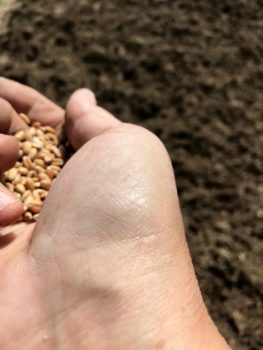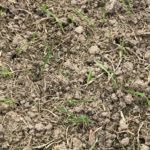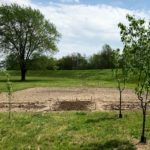
Rouge de Bordeaux Wheat Seed
4 mai, 2018, jeudi
69 degrees, partly cloudy
2 mph, W wind
Seed to Loaf: Heritage Wheat Revival Project
Spring has sprung in the Illinois country and it is time to move forward with one of the upcoming garden projects close to Carol’s and Jennifer’s hearts, planting three small plots of French heritage wheat in the Prairie du Rocher area, connecting the significant colonial agricultural history of the Illinois Country and Fort de Chartres. Through the successful crowdfund SeedMoney grant for the Fort’s Heritage Jardin Potager Project, heritage wheat seed was purchased last November through one of the garden’s supporting organizations, Les Amis du Fort de Chartres. The time has arrived to finally plant our seed in these test plots, acclimating our heritage wheat to our Illinois Country climate, in preparation of expanding this project next year.

Location of our Prairie du Rocher Wheat Plot
Our Heritage Wheat Revival Project celebrates the importance of the region’s rich French Colonial history of wheat cultivation. From collection and analysis of flotation samples, the grains of breadwheat (Triticum aestivum) from early eighteenth-century deposits at the Cahokia Wedge, represent the earliest records for this introduced grain crop in the Mississippi River Valley. Historic records indicate spring wheat was extensively cultivated very early by the French in the Illinois Country and we have chosen the heritage wheat variety of Rouge de Bordeaux to be planted in our wheat plots. This French wheat variety of eighteenth-century French Colonial history was picked after consulting with heritage wheat experts.

Village President Ray Cole helping take the soil samples for our PdR Wheat Plot.
Early this year, we received support and permission from the Village of Prairie du Rocher to create a point of interest location on the King’s Road, modern day IL Route 155, planting a small 10’ x 10’ wheat plot in Prairie du Rocher near the levee, on Village property. Two additional project plots are planted in the area, with one of the plots located within the Fort de Chartres’ jardin potager. In January, the Fort de Chartres Heritage Garden successfully applied for additional heritage wheat project support through a mini grant offered by the University of Illinois Extension’s State Master Gardener Program. We are collaborating with the Village of Prairie du Rocher, area Master Gardeners, and the University of Illinois Extension staff to demonstrate small wheat plot techniques and other educational opportunities and classes while maintaining these 10’ x 10’ village wheat plots, exploring our region’s wheat history and the modern relevancy of growing wheat in small plots. Thank you to the Prairie du Rocher Village Board of Trustees and Alicia Kallal, University of Illinois Extension’s Horticulture Extension Educator, for their support of this heritage wheat project.

Wheat seed sprouts!
The Seed to Loaf heritage wheat project timeline began in March with a soil test and preparation of the village plot for planting, thanks to Les Amis and Fort de Chartres’ supporter, Terry Wyciskalla. Terry is a Soil Fertility Specialist from Nashville, IL, and he we are grateful for his donation of the soil testing and the amendments needed for our wheat plots. Early this April, the Prairie du Rocher plot was planted and now the plot will be maintained and demonstrated throughout the spring and summer months with the harvest of wheat in late summer. Fall will bring demonstrations of the processing and the milling of a portion of the wheat kernels into flour.
As spring flows into summer, stop by our heritage plots in either Prairie du Rocher or in the jardin potager, and stay tuned as we announce updates and related demonstrations for our Seed to Loaf wheat project. We hope this heritage project will increase the region’s understanding of its rich cultural heritage of wheat cultivation and its importance in pre-statehood history, especially in this Illinois Bicentennial year.
The Fort’s jardin potager is moving apace with the season as temperatures rise and soil temperatures warm. To follow reacent work in the jardin, check in on the garden’s Facebook page for the latest news. Happy spring!
Leave a Reply